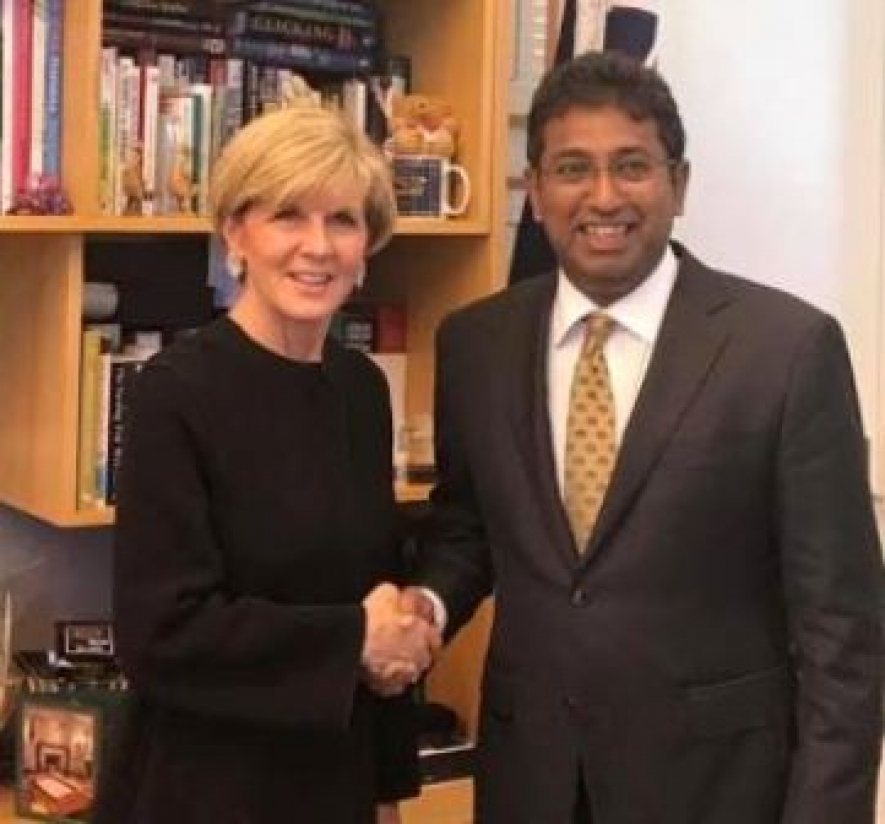The discussions on the mineral industry were among the several agenda items for the Deputy Minister’s visit which sought to develop collaborative and innovative relationships between the two countries. The Deputy Minister was following up on the discussions relating to the visit of Prime Minister Ranil Wickremesinghe in February 2017. The need for mapping of Sri Lanka’s mineral resources which has never been done was discussed during the Prime Minister’s visit.
The Deputy Minister held discussions with officials of Geo-Science Australia which is the repository of data on Australia’s natural resources. He pointed out that an island wide survey of Sri Lanka’s mineral resources is a prerequisite for Sri Lanka to utilise the potential of the mineral industry and get investors interested in establishing linkages from Sri Lanka to global production networks. Geo-Science Australia responded positively regarding bringing Australia’s experiences and expertise to Sri Lanka and undertaking a needs assessment visit.
In Canberra, the Deputy Minister called on Foreign Minister Julie Bishop and the Minister for International Development Senator Concetta Fierravanti-Wells where a range of issues of bilateral interest and concern were discussed. Foreign Minister Bishop expressed support for the Government’s reconciliation efforts and conveyed Australia’s appreciation for Sri Lanka’s cooperation in combating people smuggling. Both Ministers highlighted the contribution made by the Sri Lankan community in Australia and who possess expertise and skills that can be harnessed for development work in their country of birth.
In Melbourne, the Deputy Minister visited the Australian Nuclear Science Technology Organisation (ANSTO) and the Australian Synchrotron which is a world-class research facility that uses accelerator technology to develop scientific applications in sectors from medicine and nanotechnology to manufacturing and mineral exploration. The Deputy Minister invited the scientific leadership at the Australian Synchrotron to focus on finding root causes of chronic kidney disease of unknown etiology (CKDu) which is affecting several tens of thousands, mainly farmers, in the North Central Province of Sri Lanka.
During discussions with Asialink at Melbourne University, the Deputy Minister reached an agreement to send teachers at Sri Jayewardenepura Kotte Maha Vidyalaya who are piloting Sri Lanka’s first ever “cloud smart classroom” on a tour to Australia to learn from Australian practitioners about applying technology in the classroom.
The Deputy Minister also met with officials of the Business Council of Australia in Melbourne and discussed a proposal to prepare a presentation to be shared with the top 100 Australian CEOs about the opportunities for investment in Sri Lanka. He also discussed expansion plans of Sri Lankan operations of KOOKAI, an Australian owned fashion label which has a significant presence in Sri Lanka.
During the visit the Deputy Minister had two speaking engagements where he delivered a public seminar titled “Sri Lanka in Transition: Opportunities and Challenges” at the South Asia Research Centre of the Australian National University in Canberra and a Roundtable Discussion at Asialink, Melbourne University with academics, INGOs, and business community.
Deputy Minister was accompanied by High Commissioner Somasundaram Sakandakumar and Consuls General in Sydney and Melbourne, Lal Wickrematunga and Prasanna Gamage.




















